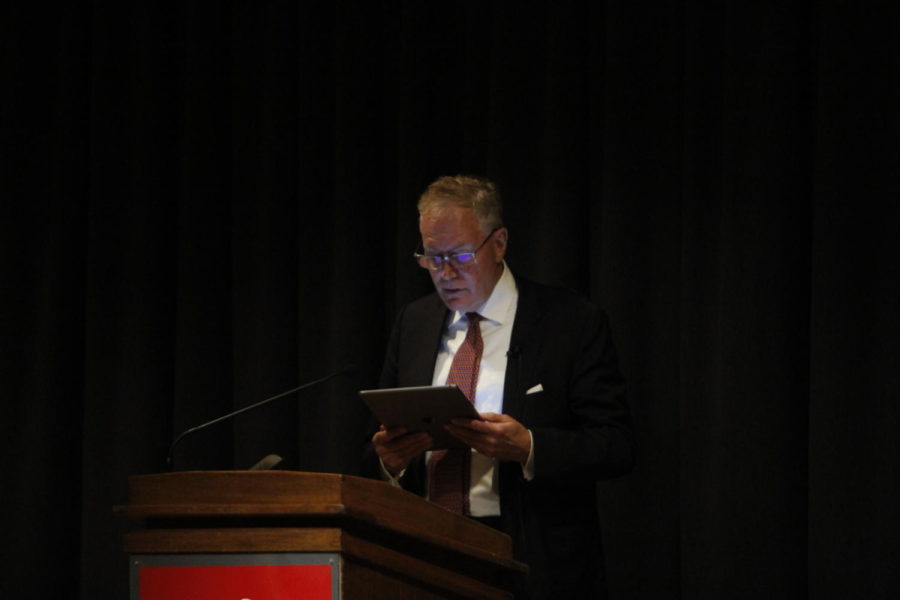Former Canadian diplomat delivers wide-ranging lecture at Iowa State
Colin Robertson talks about how myths about the United States and Canada relations need to be debunked in order to make better relations in the Sun Room on Mar. 7. Vice President of Canadian Global Affairs Colin Robertson runs the Global Exchange podcast.
March 7, 2019
Former Canadian diplomat Colin Robertson spoke Thursday evening at the Iowa State Memorial Union about Canada and U.S. relations.
Robertson discussed a variety of topics in his lecture and in his question and answer session which lasted for roughly an hour: from the newly renegotiated North American Free Trade Agreement (NAFTA), to the current scandal surrounding the Canadian federal government to the history of relations between the countries.
According to Americans for Families & Farmers, the majority of Iowa’s food and agricultural exports went to NAFTA partners, indirectly supporting more than 750,000 jobs in Iowa.
Noting he posed the title of the lecture, “Canada-US relations: Still friends, partners and allies?” in the form of a question, Robertson said he did so in the light of recent events, citing a Pew poll finding the percentage of Canadians who have a favorable view of the United States and confidence in the U.S. president has dropped since President Barack Obama left office and President Donald Trump entered office.
Robertson quoted President John F. Kennedy who said to the Canadian parliament in 1961, “geography has made us neighbors, history has made us friends, economics has made us partners and necessity has made us allies. Those whom God has so joined together, let no man put asunder.”
Following his lecture, Robertson opened the floor to questions from the audience.
An audience member spoke about how the middle class is declining as a proportion of the American population. He said his job moved to the Maquiladora in Juárez, Mexico.
The man said more than 2,000 employees lost their jobs at his factory and said he has no healthcare and no retirement plan, and it is hard to find a job despite being newly trained in a STEM field. He blamed NAFTA for the outsourcing of these jobs.
“There’s a lot of Canadians and Americans who face the same plight,” Robertson said in response. “That’s where governments truly do have a duty to stand up. I do think that universal healthcare does make a difference.”
The United States, Canada and Mexico completed renegotiations of NAFTA last September. However, it may face difficulties being ratified by the United States in the wake of the Democratic takeover of the U.S. House of Representatives.
“If there’s obstruction [by Democrats] like Obama faced from Republicans, then it may be difficult for this renegotiation to be ratified by Congress,” Robertson said.
There are provisions in this renegotiation requiring a $16 minimum wage in the auto industry for their products to be eligible for freer trade and to protect the environment in this renegotiation. Those provisions should make it an easier vote for congressional Democrats who have labor or environmental concerns, Robertson said.
Another audience member asked Robertson about the scandal Prime minister Justin Trudeau faces. Trudeau allegedly pressured his then-Attorney General Jody Wilson-Raybould to pursue a non-criminal prosecution of a construction firm in his home province of Quebec and demoted her to a lesser cabinet role when she refused to comply.
“I’ve recently heard about the troubles with the Trudeau government, and how do you think he will get through that and in addition how would some future prime minister, future government — is there anyone who would take more of an inward stance with the United States?” the audience member asked.
Robertson said he believed “Trudeau has not been as straightforward as he could have been,” and was unsure if a hypothetical future prime minister would take a different approach to dealing with Trump.
Polling analysis by the CBC’s Éric Grenier finds that the federal election scheduled for October will be closely fought between the incumbent Trudeau’s Liberal party and the opposition Conservatives.
Regardless of who wins the election, Robertson said he believes that U.S.-Canada relations will remain a top priority for the next prime minister.
“I think that most Canadian prime ministers understand that they have three really critical files: the national security file, the federal-provincial [relations], unity of the country and the third, the most important file is with the United States, and that relationship with the president of the United States is vital and successful prime ministers get that,” Robertson said.

















